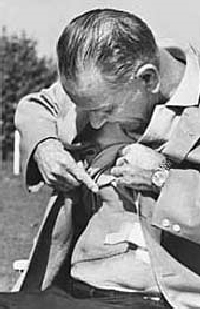 I think we all know the Presidency of the United States is a very demanding job. Every now and then we comment on how the job ages the Commander-In-Chief, such as: "Gee, did you see how gray he's getting," or "Wow, he's really starting to look worn out." As bad as the president ages in office, it is not uncommon for his health to decline more rapidly upon his retirement. LBJ, for example, had heart trouble and died just four short years after leaving office. Richard Nixon lasted longer (20 years) but became gravely ill after leaving office, suffering from phlebitis and a blood clot. Eisenhower died of congestive heart failure after eight years of retirement, and Ronald Reagan had his "long goodbye" with Alzheimer's disease. These were all men who drew their strength from the office they occupied, but when it was over, it was like someone pulled an electrical plug from a socket and they slowed to a stop.
I think we all know the Presidency of the United States is a very demanding job. Every now and then we comment on how the job ages the Commander-In-Chief, such as: "Gee, did you see how gray he's getting," or "Wow, he's really starting to look worn out." As bad as the president ages in office, it is not uncommon for his health to decline more rapidly upon his retirement. LBJ, for example, had heart trouble and died just four short years after leaving office. Richard Nixon lasted longer (20 years) but became gravely ill after leaving office, suffering from phlebitis and a blood clot. Eisenhower died of congestive heart failure after eight years of retirement, and Ronald Reagan had his "long goodbye" with Alzheimer's disease. These were all men who drew their strength from the office they occupied, but when it was over, it was like someone pulled an electrical plug from a socket and they slowed to a stop.Presidents do not possess a monopoly over this phenomenon as many people experience it upon their retirement, whereby life slowly grinds to a halt. I contend that regardless of whether we like or dislike our jobs, we draw strength from them. Our body's physical regimen adapts to our work, it keeps us alert and gives us a rhythm. Our bodies may grow weary over time, but it adapts and tries to operate routinely. For example, suppose you normally wake up at 5:30am every working day. Come the weekend or a day off, your body has an inclination to wake up at the same time and expects you to follow your routine. If you do not, you might feel out of sorts because the pattern has been disrupted.
I discussed my thesis with a doctor friend who confirmed my suspicions. He said he often sees this phenomenon in his office; a variety of ailments begin to form the moment a person retires. Even when a person develops a physical problem while still working, quite often his physical regimen adapts to the problem and masks it. Yet upon retirement, the regimen relaxes and the problem quickly manifests itself into a serious medical problem.
When we decide to retire, it is important we somehow remain active. We may not have a high powered job anymore, but we can ill-afford to relax too much and stagnate. There are obviously a lot of things we can do to stay busy and it needn't be too taxing mentally or physically. For example, play a sport like golf, tennis, fishing, or basic exercise and walking; take up a hobby; garden or perform home repair; take on a smaller part-time job; volunteer in your community such as something for your local school, hospital, hospice, library, chamber of commerce, or become actively involved in a nonprofit organization; attend school or, better yet, teach part time (after all, you may very well possess certain knowledge and wisdom that a younger person may need personally or professionally).
Changing and adapting to life after retirement is the hard part. Making the transition to your new life requires you to break some old habits and build new ones, which is something we tend to resist as we get older. The point is, resting and physically degenerating is the easy part, working and enjoying life is the hard part. As Malcolm Forbes observed, "Retirement kills more people than hard work ever did."
For my earlier article on "Retirement" click HERE.
Keep the Faith!
Note: All trademarks both marked and unmarked belong to their respective companies.
 Tim Bryce is a writer and the Managing Director of M. Bryce & Associates (MBA) of Palm Harbor, Florida and has over 30 years of experience in the management consulting field. He can be reached at timb001@phmainstreet.com
Tim Bryce is a writer and the Managing Director of M. Bryce & Associates (MBA) of Palm Harbor, Florida and has over 30 years of experience in the management consulting field. He can be reached at timb001@phmainstreet.comCopyright © 2010 by Tim Bryce. All rights reserved.
No comments:
Post a Comment